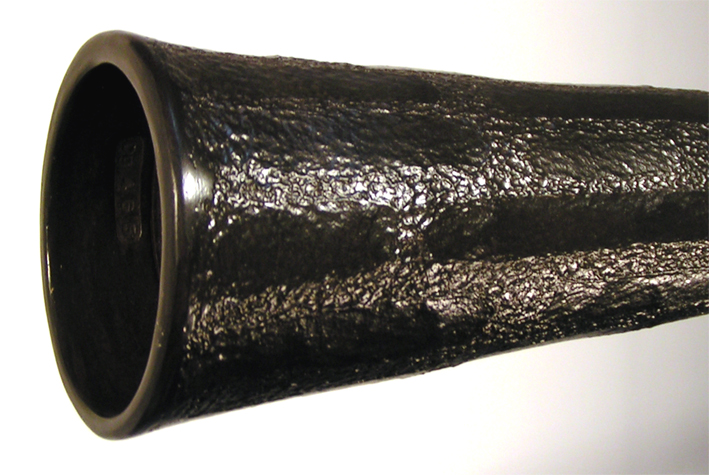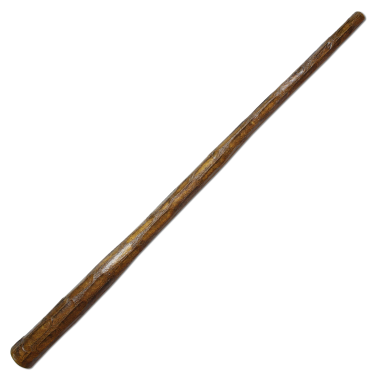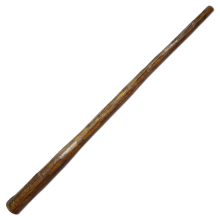HempStone Hemp HE511
HempStone didgeridoos are 100% natural! Hempstone or 'hemp stone' once transformed is as hard as stone. The innovation of this Austrian patent lies in the fact that the hemp fiber is overmolded under heat and high pressure only by adding water. During the manufacturing process, no need for glues, resins, etc. It is dyed with non-toxic pigments. “This material is said to be non-toxic and malleable”
Norbert Schmid, an Austrian, is the precursor of the manufacture of didgeridoos in Hemp. (Long before the Australian models...) It should be remembered that this material was developed by an Austrian scientist. Hempstone material is made solely from hemp fiber without additives, glue or synthetic adhesive agents. Hemp fiber is denser than the hardest wood, can reach frequencies and resonate with energies that lie beyond the capacity of traditional wooden instruments.
Nobert's comments: Material used Hemsptone + 6% organic charcoal added. The instrument is varnished with Legnopur and thus shows a complete waterproof surface inside and out with Adler Soloplast varnish on the outside. The added biochar is produced by Gerald Dunst, a specialist in soil conditions and composting. It is made from organic husk of wheat and other cereals. The finely ground charcoal is mixed and incorporated into the wet hemp pulp and gives the material a very special deep color!
My comments: Why look on the other side of the planet for what we have on our doorstep... It took me a while before starting to work with Hempstone in Austria, because I found in comparison to Jon Worsley's Yidachi that the first configurations lacked power and precision. I had the opportunity to test the latest models and believe me I made a big mistake... Norbert has developed different configurations and models of didgeridoos over the years. To this day these didgeridoos are sought after all over the world. Production is very limited due to the long process and the unique character of each instrument. The Hempstones have an incredible richness of sound, good precision and excellent response to attacks and percussive plays. Norbert managed to combine: configuration of the air column and density of the material to ultimately obtain terrible acoustics and thus release new frequencies. I have to say I'm really surprised. This material fears nothing, neither blows nor humidity and above all at a price which has nothing to do with other Hemp didgeridoos...
- Shipping costs are free! (only for France) I will use a private courier (UPS) for shipping.
- Didgeridoo Passion also offers you the carrying case!
Classification
This scale is the result of an air column/bell start ratio If we divide the diameter of the bell with that of the beginning of the air column we get a number between 1.5 and 3.5. We can classify all the didgeridoos in 4 large families. Each family groups the instruments with a similar character, simply based on the overall shape of the air column (conical/cylindrical) and on the diameter of the column (wide/narrow). The result is a simple and very reliable reading grid, making it easier to search and purchase on line.
The diameters are measured with a caliper, start of the air column after the mouthpîece. This ratio is very reliable for a didg having a air column with a 'smooth' internal work, in the case of a hollowed eucalyptus instrument it give an approach of the instrumental character.

Hempstone
Hemp didgeridoo by Norbert Schmid
Norbert Schmid, an Austrian, was the pioneer in the manufacture of didgeridoos in Chanve. (Long before the Australian models...) It should be remembered that this material was developed by an Austrian scientist. Hempstone material is made solely from hemp fibers with no additives, glue or synthetic adhesive agents. Hemp fiber is denser than the hardest wood, can reach frequencies and resonate with energies that lie beyond the capacity of traditional wooden instruments.
 Hempstone or 'hemp stone' once transformed is as hard as stone. The innovation of this Austrian patent lies in the fact that the hemp fiber is overmolded under heat and high pressure only by adding water. During the manufacturing process, no need for glues, resins, etc. It is dyed with non-toxic pigments. “This material is said to be non-toxic and malleable”
Hempstone or 'hemp stone' once transformed is as hard as stone. The innovation of this Austrian patent lies in the fact that the hemp fiber is overmolded under heat and high pressure only by adding water. During the manufacturing process, no need for glues, resins, etc. It is dyed with non-toxic pigments. “This material is said to be non-toxic and malleable”
Norbert has developed different configurations and models of didgeridoos over the years. To this day these didgeridoos are sought after all over the world. Production is very limited due to the long process and the unique character of each instrument.

